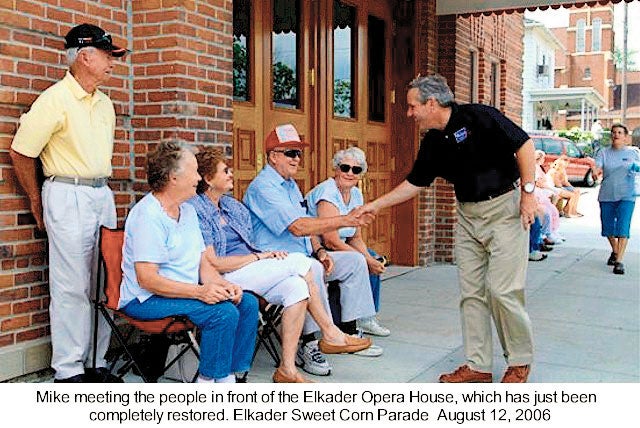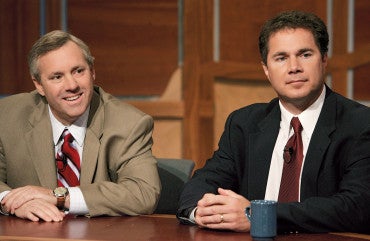
It’s not always easy being a Harvard lawyer on the campaign trail.
In Dallas, Will Pryor ’81 has rung some 7,000 doorbells in Texas’ 32nd District in his pursuit of a Democratic seat in the U.S. House of Representatives. Being a lawyer isn’t always a plus with voters, he says.
Same in Iowa, where Republican Mike Whalen ’78 is trying to win a House seat in that state’s 1st District. “I heard you were a lawyer,” an elderly woman tells him at a campaign appearance, as she peruses his brochure. “I hope you didn’t go to … Oh my God, you did!”
Such is life on the campaign trail for Pryor and Whalen, two first-time congressional candidates who are both hoping their careers outside of politics will propel them to victory in November.
Pryor has run for office once before, winning a race for a Texas district court judgeship in 1986. He now operates a mediation and arbitration firm in Dallas. For most of his life, Pryor says, he knew he would eventually run for office. His family includes many politicians, including his uncle (David Pryor, who served in the U.S. House, and also as governor of Arkansas and as a U.S. senator) and his cousin (Mark Pryor, currently a U.S. senator from Arkansas). And Pryor’s grandmother was the first woman to run for public office in Arkansas, making an unsuccessful bid for a school board position. That same grandmother always told him, “It’s important that good people serve,” he recalls. “I grew up with the expectation that I would run for public office one day. I joke about it a lot. I’m genetically miswired.”

Unlike Pryor, who has made his career in the law, Whalen has never practiced. The summer after he graduated from law school, he opened a restaurant in Davenport, Iowa, in a building his family owned. That restaurant, the Iowa Machine Shed, has since grown into Heart of America Restaurants & Inns, a multimillion-dollar company, which operates 26 restaurants and hotels in the Midwest. As an entrepreneur, he was drawn into work with the National Center for Policy Analysis, a think tank where he served as a board member. “I’m a business person and someone who has been very interested in policy,” says Whalen. “I couldn’t sit on the sidelines. Our political system needs to be responsive to the velocity of change in the nonpolitical world.”
Both men have entered their races as underdogs. Pryor is facing five-term Republican Pete Sessions in a politically conservative district made even more Republican after redistricting efforts orchestrated by former House Majority Leader Tom DeLay. Whalen won his Republican primary handily in June, garnering 48 percent of the vote in a three-way race. He is facing trial lawyer Bruce Braley in November for the seat being vacated by Republican Rep. Jim Nussle, who is running for governor. However, the district is highly Democratic and considered that party’s to lose. Nationally, both the Democrats and the Republicans consider Iowa’s 1st District a crucial one to win.

Whalen says he is a “progressive, pro-growth Republican,” and Pryor describes himself as a “faith-based Democrat.” In an election widely viewed as pivotal, in which the Democrats hope to substantially reduce the GOP’s majority in Congress, both are taking aim at what they see as a prevailing attitude that the United States government is crippled by overwhelming and intractable problems. “I believe that the 21st century can be the great American century,” says Whalen. “We have to fight two battles. One is for jobs and capital investment. The other is on terrorism and for freedom.”
Pryor says people frequently ask him why he wants to confront the insurmountable problems of a gridlocked government. “I am not called to single-handedly turn Congress around,” he says. “I am called to do what I can do, and I can do this. I believe we can fix any of the problems that we are facing if we have more people who have balance and who have the perspective of long-term, bipartisan solutions. There are plenty of them up there in Washington, we just need more of them.”
Pryor attended his 25th law school reunion in June. The timing was ideal. He returned to Dallas with his class directory in hand, and he has been reconnecting with law school friends and gaining new ones as he diligently goes through the directory making fundraising calls. “A significant number of people have supported me,” Pryor says. “They tell me they’re glad to hear what I am doing.” He has since moved on to his undergraduate directory, where he has found particular support among his teammates on the Yale University baseball team. Pryor captained that squad, a distinction he shares with President George H.W. Bush.
Whalen’s campaign manager is his law school classmate Russ Perisho ’78. In March, Perisho, a partner at Perkins Coie in Seattle, took a leave of absence from his labor and employment practice to help with Whalen’s campaign. “It’s rare for an opportunity like this to come along in your professional career where you can help out a friend and be a part of such an interesting process and feel like you’re doing some good,” he says.
Perisho is not the only Harvard-trained lawyer who has put his law practice on hold to run a congressional campaign. In California’s 25th District, the campaign of Democrat Robert Rodriguez, a 2002 graduate of Harvard’s John F. Kennedy School of Government, is being led by three HLS alumni: Ankur Desai ’02, Armen Meyer ’02 and Sarah Apsel ’03.
As yet, Whalen has not mined his law school directory for donations and support. But, he says, “Anybody who wants to support a progressive pro-growth Republican can skip me having to call them, and support me.”
